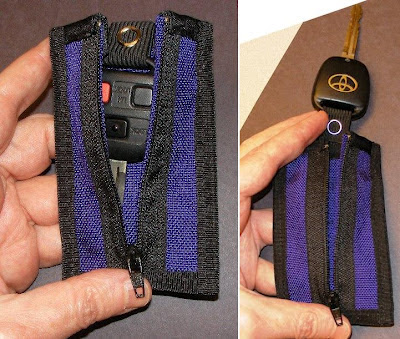PHOTO: a custom sewn nylon case to hold and protect a Toyota FJ Cruiser smart key, which won't fit in a standard key case, and to prevent accidental pressing of the buttons, which open and lock the doors or initiate a panic alarm by honking the horn and flashing the lights. The key is very expensive to replace if it is damaged because it contains a microelectronic chip and a battery inside the head of the key to transmit the security codes needed to lock and unlock the doors as well as a unique radio frequency RFID number that is sensed when the key is inserted into the ignition. This code provides additional security that prevents a car thief from being able to steal the car by making a physical copy of the key or picking the locks because neither will start the car without the key transmitting the unique number in its chip to the car's security computer, which has also had the unique number programmed to its engine computer via a secure process at the manufacturer or dealership.
For convenience and to prevent car theft, more and more cars come with these big fat keys and even a separate fob. The problem with these so-called "smart keys" is that they are often bulky (even more than the one shown above) and very easy to damage or press a button if you just put it in your pocket. In addition, the bare jagged metal key is likely to rip your pocket, which is what key cases were invented for decades ago. I am sure that someday, there will be an app for all the handheld smart phones that will do the same unlocking function and it will eliminate the need for carrying a bunch of keys. Of course, this will require a secure standard that is hard to get every manufacturer to agree to doing.
Photo links:
